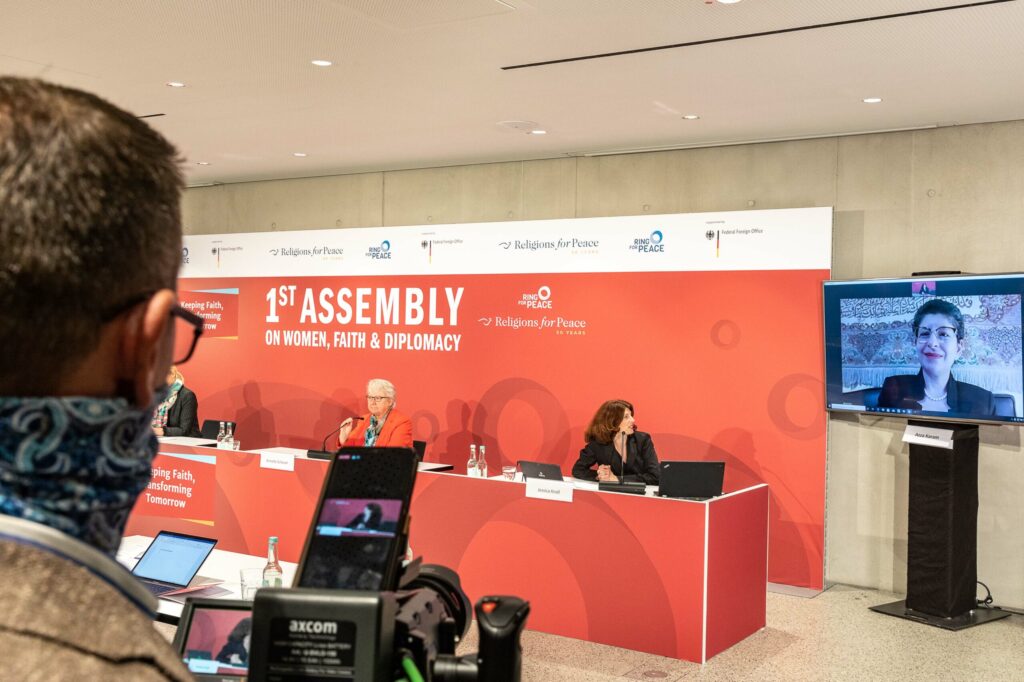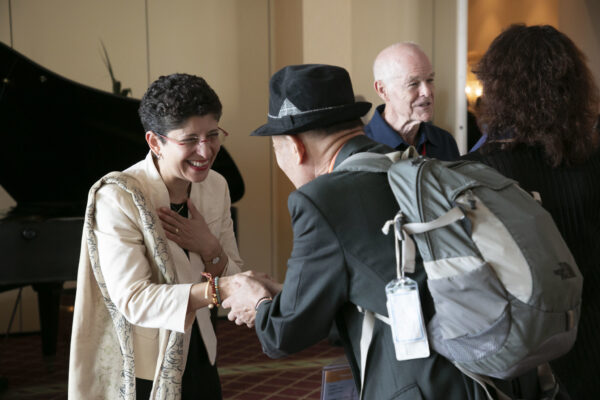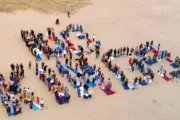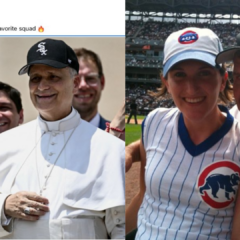This article was originally published in Religion Unplugged, with the support of CRCC’s global project on engaged spirituality.
LINDAU— Azza Karam was just about to step up to the podium at the Inselhalle in Lindau, Germany to accept the position of Secretary General of Religions for Peace International (RfP) on Aug. 23, 2019.
Shortly before her speech, she spoke off-stage with Sonia Guajajara, an indigenous representative from Brazil.
Karam was leaning in, listening carefully to what Gaujajara had to say about the environment and the need for RfP — a multi-religious platform with the representation of diverse religious institutions and communities — to make a bold statement about climate change. As Gaujajara finished, Karam smiled, thanked her, and said, “When it comes to issues like climate change, what the world needs is more women like you.”
Perhaps it is telling that before one of the more momentous speeches of Karam’s career, she wasn’t pacing backstage or making final preparations for the presentation. Instead, she was taking time to hear, and be present with, one of the valued, female members of the organization she was about to accept the leadership of.
That, as Karam tells it, is one of the prime directives of her tenure as RfP Secretary General — to raise up women’s voices within and across religious traditions and see her fellow females not only “take their seat at the table,” but step out in front and lead the way to meaningful change on a range of issues confronting the world today.
To that end, Karam’s RfP — with the Foundation Peace Dialogue of the World Religions and Civil Society (Ring for Peace) and supported by the German Federal Foreign Office (Ministry of Foreign Affairs) — is convening the first assembly on “Women, Faith and Diplomacy: Keeping the Faith and Transforming Tomorrow.”
Originally scheduled to take place in Lindau, the event is now being held online, November 10-13, 2020. More than 600 participants from 90 countries are gathering virtually, and in person, to discuss the role of women in the world’s religions and their leadership in the realms of faith and diplomacy.
Karam said it is an opportunity for representatives from the media, civil society, international development, academia and religious institutions to celebrate how far they’ve come in terms of women’s leadership on issues of peace and security, sustainable development and human rights.

Press conference in Lindau about women and faith diplomacy.
The whole point of the assembly is to help attendees better “appreciate the breadth and the depth of contributions of women in the realms of faith and diplomacy across the world,” Karam said.
At the same time, it is also an opportunity to wrestle with how far they have to go.
Women’s leadership — and resistance to it — in these realms is something that Karam is intimately familiar with. Over a decades’ long career in academia, diplomacy and interreligious dialogue, Karam has faced impediments to her fierce initiative from a variety of colleagues. Karam said she has frequently faced belligerence from people of faith who would not accept her leadership.
“There is a common culture in religious communities, no matter what religion, no matter where they are, where women are not supposed to claim credit for what they do or be up front,” she said. “They are meant to serve, be in the background, and not attract attention to themselves.”
“I never learned to fit that mold,” said Karam.
Disheartened, but never daunted, Karam pressed on to take on leadership roles as Professor of Religion and Development at the Vrije Universiteit in Amsterdam, Senior Advisor on Culture at the United Nations Population Fund (UNFPA) and as Chair of the UN Inter-Agency Task Force on Religion and Development.
Growing up with prayer, devotion and tension
For Karam, the journey through such positions of influence and leadership in faith and diplomacy started in childhood, growing up in Egypt and India.
“The earliest memories I have,” she said, “are of my parents praying in our home in Egypt.” Right next to these recollections of religious devotion are memories of her “ayah,” or nanny, in India where Karam spent her first four years as a child. “Every day, she would do the offerings at her shrine,” said Karam, “but never in the house, because my parents would not allow it in their household.”
“And so, I grew up with the value of prayer and devotion,” she said, “but also with the awareness of how they can be the source of the greatest contention and tension in communities.”
It was this dissonance, and at the same time the similarity in sentiment, between her nanny’s puja and her parents’ praying that Karam said set her on a path toward leading people of many faiths into dialogue and common action.
Another set of experiences instilled in her the importance of women’s rights. It was the 1970s in Egypt and her aunt wanted to get a divorce. “Laws notwithstanding,” it was, in Karam’s words, “sheer hell to get a divorce as a woman and, to be honest, it still is.”
Her aunt was a faithful Muslim, an independent mother and a public servant. And yet, she struggled for years to get a divorce because of a dispute over property that she herself had purchased. The irony, said Karam, was that this was all going on while Jehan Sadat, the first lady of Egypt, was championing women’s rights and reform.
“So here was my destitute aunt with her three children, with laws in her favor to give her the right to be divorced, and people were preventing her from getting the divorce she was entitled to,” Karam said, “and much of the resistance came from religious actors.”
For Karam, this cemented the interest she had in trying to understand the intersection of politics, religion and gender and how that plays out in everyday lives. “Because it’s not a simple black-and-white issue everywhere in the world where people of faith do nothing but good,” she said, “it doesn’t quite work out that way does it?”
Those were some of the tensions that Karam brought to her efforts in intergovernmental work at RfP and the UN.
Bringing faith to the United Nations as a solution, not a problem
After serving at RfP from 2000 to 2004 as Director of the Global Women of Faith Network and Advisor on Middle East Interreligious dynamics, Karam made the move to the UN, where she found a completely different universe from her work at RfP.
“At Religions for Peace, it was normal to talk about religion, you don’t even think about it,” she said, “but the UN was a completely different culture to come to terms with. The general message around the UN was, ‘We don’t talk about faith. We don’t do religion.’”
More than strange, this was nonsensical to Karam. She said, “The UN is supposed to be the quintessential universal culture and they don’t do religion? It was almost a denial of self.”
While working as Senior Advisor on Culture at the UN Population Fund (UNFPA) Karam worked to bring different religious voices together to create “a certain synergy around how faiths inform us and our politics.” She said the problem wasn’t with religion, but with the silos that institutions put up between the religious and the secular, the intergovernmental and the interdenominational.
Karam saw an opportunity to create a space for UN agencies to learn about spirituality, listen to religious leaders, and understand the beliefs and rituals that motivate people to do both great good and great evil in the world.
The result was the founding in 2010 of the UN Interagency Task Force on Religion and Sustainable Development (UN-IATF), meant to inform and support actors in the UN universe to understand the why, how, who and what of religion and engaging with religious actors.
For Karam, it was a matter of the heart.
“Yes, when you step through the UN doors, you have no country, you have no religion, you serve all regardless, ostensibly. But how can you serve all regardless if you don’t understand what touches other people’s hearts?” she said. “We’re kind of missing the heart of a human being if we’re not talking about their faith.”
Karam sees understanding a person’s religious motivations as an essential step for the UN to form grassroots partnerships.
“Religion matters in the work the UN does,” she said. “It is the heartbeat of anything that we think we can do to heal the world’s problems.”
Her legacy in that regard is long. Today, the UN-IATF includes more than 20 UN agencies and provides policy guidance around engagement with faith-based actors. In 2018, the UN-IATF established the Multi-faith Advisory Council (MFAC), an informal and voluntary entity that consists of 45 religious leaders and heads of faith-based organizations (FBOs), including RfP.
One of the MFAC’s members is Rabbi Burton Visotzky, Appleman Professor of Midrash and Interreligious Studies at the Jewish Theological Seminary in New York City. He said Karam was “the mother of us all.”
“Without Azza bringing together these different agencies to talk about religion and listen to representatives of religious traditions, the UN may still have not ‘discovered religion,’” Visotzky said. “And that, would be a detriment to the world, because the sad truth is that a lot of incitement to violence and tension comes from religious leaders.”
He said he has seen a shift in the UN’s operations.
“Anytime UN agencies would go to a hotspot or where there is enormous poverty, who would they find already at work there?” Visotzky said. “Religious actors. Whether it’s Islamic Relief, Catholic Relief Services, Bread for the World or the American Jewish World Service or other FBOs, they were the ones working with development organizations to lift people out of poverty and build peace.”
Now the UN understands that uniting religious leaders around a common cause can lower tensions, and they are keen to partner with MFAC, Visotzky said.
Women of faith often go unnoticed in development work
Often times, Karam is quick to remind, it is religious women who are making the greatest impact on the front lines. That is why, with funding from the Ford Foundation, Karam founded the first Global Women of Faith Network while at RfP before and now, as Secretary General, she has convened the “Assembly on Women, Faith, and Diplomacy.”
Karam said the event is an opportunity to celebrate the work of women of faith doing immense work around the globe.
“The work of women of faith is nothing new,” she said, “what is new is the collaboration between men and women to bring the voice of women to speak to certain, critical, global truths.”
Pointing away from her own immense accomplishments, she highlighted the work of women of faith involved in RfP’s network that are making a real difference on the ground.
She spoke of Mme. Cissé Hadja Mariama Sow, President of Muslim Women of Guinea and RfP Co-President, who has worked at the front lines of interreligious peace, reconciliation and critical issues facing women in West Africa for over half-a-decade.
A Muslim, she became increasingly involved in politics and interreligious dialogue with other women of faith from more than 50 years ago. An advocate for education and equal rights and representation for women, Sow said she worked “to mobilize and organize women in religious affairs” and see women not only read, learn and memorize their scriptures, but interpret and apply them to the social issues they deem critical.
In churches and mosques and multi-faith institutions like the West African Women’s Association (WAFA), of which she was president, Sow said that she has witnessed a marked improvement, with women participating in various levels of religious activities.
Interpreting the Qur’an for herself – and in concert with the women she works so intimately with – Sow is committed to fighting against religious fanaticism, especially in Guinea, her home country.
“Violence has no part in Guinea or Muslims,” she said, “we must learn to do better.”
A mother of eight, Sow has also turned her religious energies toward family planning in Guinea. She said, “the effort to develop family planning in Guinea cannot succeed without the full commitment of religious and traditional leaders.”
Thankfully, Sow said, both the government and religious bodies have listened and are making the changes she and her fellow religious women advocated so long for.
She also praised the work of Dr. Lilian de Jesus-Sison of the Philippines, a Catholic.
A chemistry professor for most of her life, Jesus-Sison became Secretary-General of RfP Philippines as “a way of giving back,” she said.
Working with different faith groups, her advocacy took her to the hinterlands of the conflict areas in Mindanao addressing the trauma of internally displaced women and children, working on child protection projects with UNICEF and helping women to respond to issues such as climate change and human trafficking. The results of her work became models for similar efforts in Brazil, Bosnia Herzegovina, Thailand and Myanmar.
Similar to Karam, Jesus-Sison found this type of work to be a matter of heart and soul. “I was only able to transcend the darkness in life because of my strong devotion to the blessed Mother. She is my constant companion in generous giving.”
At each turn in her long life of learning and service, Jesus-Sison said her faith has remained a constant motivation. Born into an active Catholic family, working at a Dominican university and taking part in the famous Marian processions of Manila, Jesus-Sison was always grounded in her religion’s proverbs and rituals.
“If you read the letter of St. Paul to the Corinthians, it says that whatever we do, we do it all for the glory of God,” she said, “and that is the one thing that has motivated me and inspired me in all the work that I did.”
Whether it was actively promoting a “preferential option for the poor” or loving her neighbor through interreligious dialogue and common action, Jesus-Sison said she did all of it “as excellently as possible, because in my view, I’m doing it for the glory of God.”
Another woman who typified the kind of work Karam wants to see more widely recognized is that of Honorable Ela Gandhi, granddaughter of Mahatma Gandhi and a peace activist in South Africa.
While Sow is a faithful Muslim and Jesus-Sison a committed Catholic, Gandhi’s spiritual draws from a broader stream of spirituality in her exemplary efforts on behalf of human rights.
One misperception many have, she said, is that she does not belong to any formal religious group. “I was brought up in the tradition of my grandfather, who was a universalist and drew from many traditions,” Gandhi said, “and so I promote the Ghandian values I learned from my family.”
Drawing on a diverse array of spiritual sources – from her Hindu background to the influential Christians and Muslims who fought injustice alongside her – Gandhi played an active role at many pivotal moments in the anti-Apartheid movement and in South Africa’s transition to democracy.
As a social worker in Durban, Gandhi started to protest South Africa’s Apartheid government. She was harassed, subjected to surveillance and eventually put under house arrest for almost a decade of her life. Undeterred, Gandhi worked underground for eight-and-a-half years.
Along with Nontsikelelo Albertina Sisulu (“Mama Sisilu”), Gandhi was one of the people who met with Nelson Mandela and the United Democratic Front (UDF) leadership the day before he was released from Pollsmoor Prison. Gandhi then became a member of the Transitional Executive Committee (TEC) before South Africa’s 1994 elections and became a member of parliament for the next ten years, working on welfare programs and support for mothers.
While often seen on the front lines of global interreligious gatherings today, Gandhi is not always recognized for the immense role she played in fighting Apartheid in South Africa.
This might be, she said, because she is not a big fan of photographs. While others have prominent photos with famous people displayed around their offices, Gandhi’s photos are dedicated to family and friends. “Even though I was with him so many times, I do not have a single photo of me with Nelson Mandela,” she said.
Since her time in parliament, Gandhi has gone to develop the Gandhi Development Trust, is a member of South Africa’s Religious Affairs Committee and set up a 24-hour domestic violence support organization.
“For me, it is all about people,” said Gandhi, “getting to know people at the grassroots and changing their lives from the ground up, no matter their religion, their background, the color of their skin.”
Women like Gandhi, Jesus-Sison and Sow are the reason that Karam and her partners have convened the “Women, Faith, and Diplomacy” event — to create a space where “women can discover that they are advocating for very similar things, albeit couched in different religious terms,” said Karam.
In the midst of a global pandemic and at a time when international cooperation is at its most vulnerable, when the world order is facing a metacrisis of monumental magnitude, and climate change rages on, Karam believes now is not only a time for women to take their seats around the table, but up front at the podium.
And similar to Lindau one year ago, Karam does not stand alone.
Instead, she brings with her a worldwide network of women like Guajajara, Gandhi, Jesus-Sison and Sow, believing it’s time that global leaders start listening to their voices, just like she does.
Read the article on religionunplugged.com.
Ken Chitwood is an affiliate with the USC Center for Religion and Civic Culture.







